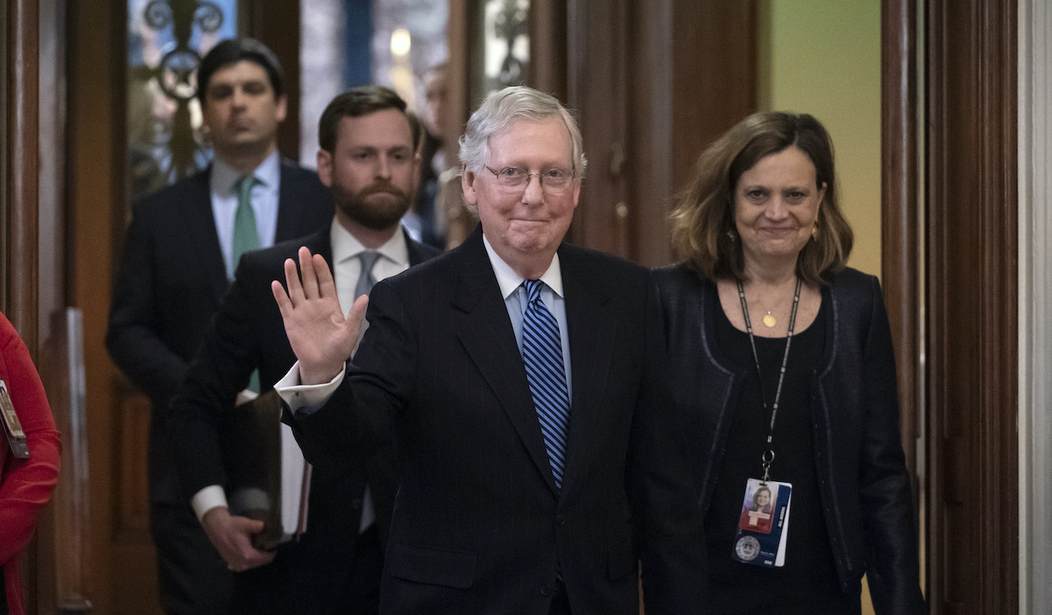Congress worked late into the night to hike up the national debt to levels that would have seemed like something out of a dystopian sci-fi film only a generation ago. The Democrats were all patting themselves on the back, particularly in the Senate, while Chuck Schumer scurried to remind everyone that they were “paying debt accumulated by both parties, so I’m pleased Republicans and Democrats came together.” And we shouldn’t pretend that Schumer is wrong here, or at least about the debt being run up by both parties. As I have complained here loudly in the past, the GOP didn’t exactly cover itself in glory during the Trump years when it came to spending and the national debt. But Schumer’s claim about Republicans and Democrats “coming together” is a significant stretch at best. While there are a couple of caveats to make note of, in the end, the debt ceiling was raised almost entirely on the terms that Mitch McConnell demanded when this entire fiasco started. (Fox Business)
The U.S. House of Representatives voted to lift the federal debt ceiling by $2.5 trillion early Wednesday and will send the bill to President Biden’s desk for final approval.
The House voted 221-209 in favor of the increase after the Senate voted to avoid a U.S. default. Rep. Adam Kinzinger, R-Ill., is the only House Republican to vote in favor of the increase. The votes followed months of discord on Capitol Hill. The Senate vote was also along party lines, 50-49.
Lawmakers expect the increase, which raises the debt ceiling to roughly $31.5 trillion, to last beyond the upcoming midterm elections and into 2023. Treasury Secretary Janet Yellen said lawmakers had until Wednesday to raise the debt ceiling or risk a potential default on U.S. obligations.
When the news of the vote in the House broke last night I took to Twitter to “celebrate” this historic “accomplishment.”
United States Gross Domestic Product 2021: $22.675 trillion.https://t.co/3ghYa2zA21
United States debt after next month: $34.1 trillion.https://t.co/M5XofpNrRM pic.twitter.com/TKhPJYaX8q
— Jazz Shaw (@JazzShaw) December 15, 2021
The technical number is $31.5 trillion, but when you add in the fake money that we’re going to set on fire if the BBB spending bonanza passes, it will be significantly higher.
As far as the McConnell angle goes, there are a couple of caveats, as I mentioned above. Remember that Midnight Mitch never said he would stop the raising of the debt ceiling (which should have been all but impossibly in theory anyway given the current makeup of the chambers). He knew he couldn’t do that and allowing a lengthy government shutdown to take place would have stuck a spear in the back of his party just as they’re gaining significant ground across the country on the generic ballot. All he said was that if the debt ceiling was to be raised, the Democrats are the ones spending the money this year so they would need to raise it on their own.
And that’s almost what happened, but not quite. On the House side, there was a single GOP vote added to the Democrats’ column from Adam Kinzinger, who is sticking a fork in the eye of his party at every opportunity. He can get away with that because he’s retiring after this term and no longer has to worry about a primary from a Trump-backed challenger. Other than that, it was strictly the Democrats closing the deal.
The Senate’s participation was cleaner in one respect, but a bit more complicated in another way. No Republicans in the Senate voted for the debt increase. But there never would have been a vote at all if McConnell hadn’t cut a deal to suspend the filibuster for this one vote. So in that sense, he most assuredly “helped” Chuck Schumer get the increase over the finish line. There’s no way they were going to find ten GOP votes for the bill. On the downside, McConnell gained no serious concessions (that we know of) from the Democrats in exchange for his assistance.
The big win for the GOP here (if you can call this sort of spending spree a “win”) is that we will maintain the status quo straight through the midterms. That avoids the messiness and political collateral damage of a government shutdown that the media would have blamed squarely on the Republicans. (Mostly accurately, if we’re being honest.) Now everyone can focus on the November elections and the many, many seats being left vacant by Democrats who have seen the writing on the wall and are either running for different offices or leaving to spend more time with their families.
We shouldn’t close without putting the new debt numbers in perspective. As mentioned in the linked analysis, the new debt ceiling is going to be $31.5 trillion, a figure that we will undoubtedly crash into shortly after the next elections. The United States Gross Domestic Product this year is estimated to be $22.675 trillion. So our debt will be nearly $10 trillion more than the total value of our economy. If that doesn’t send some shivers down your spine I’d like to borrow whatever prescription medications you’re currently taking. The ship of state is currently so top-heavy that it wouldn’t take much for it to roll over if it runs into a serious storm.
Back in 1996, when Bob Dole was slugging it out with Bill Clinton in a doomed attempt at retaking the White House, the national debt was $5.2 trillion. That was within the lifetime of nearly every person reading this article. It took our country 206 years (in 1982) to reach a debt level of one trillion dollars and people were panicking about it even then. This is debt that will never be paid. Not in your lifetime and not in the lifetimes of your great-great-great-grandchildren, assuming the country holds together for that long. (Something I’m no longer all that confident about.) And that fact will remain a constant danger to the security of our nation and our survival as a free people.
We now return you to your regular seasonal festivities. Have a great day.








Join the conversation as a VIP Member